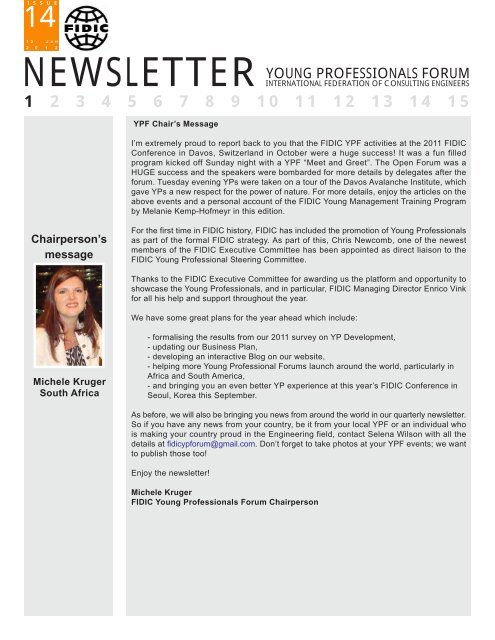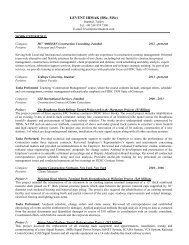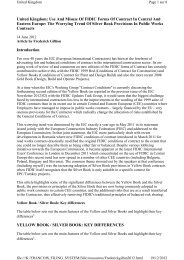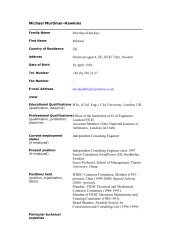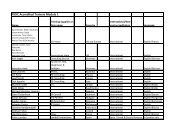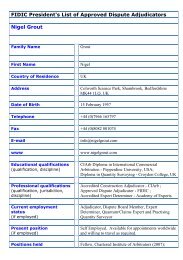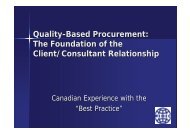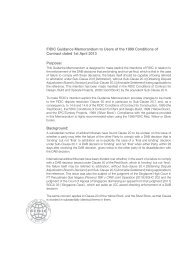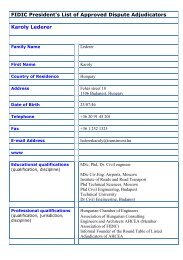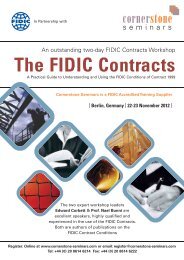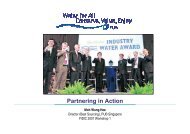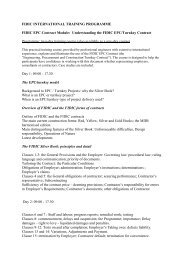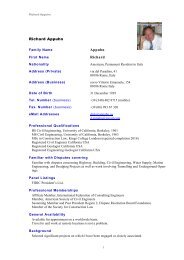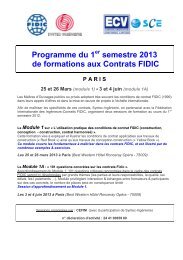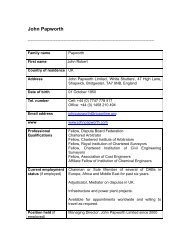NEWSLETTER YOUNG PROFESSIONALS FORUM - Fidic
NEWSLETTER YOUNG PROFESSIONALS FORUM - Fidic
NEWSLETTER YOUNG PROFESSIONALS FORUM - Fidic
Create successful ePaper yourself
Turn your PDF publications into a flip-book with our unique Google optimized e-Paper software.
I S S U E<br />
14<br />
15 Jan<br />
2 0 1 2<br />
<strong>NEWSLETTER</strong><br />
<strong>YOUNG</strong> <strong>PROFESSIONALS</strong> <strong>FORUM</strong><br />
INTERNATIONAL FEDERATION OF CONSULTING ENGINEERS<br />
1 2 3 4 5 6 7 8 9 10 11 12 13 14 15<br />
YPF Chair’s Message<br />
Chairperson’s<br />
message<br />
I’m extremely proud to report back to you that the FIDIC YPF activities at the 2011 FIDIC<br />
Conference in Davos, Switzerland in October were a huge success! It was a fun filled<br />
program kicked off Sunday night with a YPF “Meet and Greet”. The Open Forum was a<br />
HUGE success and the speakers were bombarded for more details by delegates after the<br />
forum. Tuesday evening YPs were taken on a tour of the Davos Avalanche Institute, which<br />
gave YPs a new respect for the power of nature. For more details, enjoy the articles on the<br />
above events and a personal account of the FIDIC Young Management Training Program<br />
by Melanie Kemp-Hofmeyr in this edition.<br />
For the first time in FIDIC history, FIDIC has included the promotion of Young Professionals<br />
as part of the formal FIDIC strategy. As part of this, Chris Newcomb, one of the newest<br />
members of the FIDIC Executive Committee has been appointed as direct liaison to the<br />
FIDIC Young Professional Steering Committee.<br />
Thanks to the FIDIC Executive Committee for awarding us the platform and opportunity to<br />
showcase the Young Professionals, and in particular, FIDIC Managing Director Enrico Vink<br />
for all his help and support throughout the year.<br />
We have some great plans for the year ahead which include:<br />
Michele Kruger<br />
South Africa<br />
- formalising the results from our 2011 survey on YP Development,<br />
- updating our Business Plan,<br />
- developing an interactive Blog on our website,<br />
- helping more Young Professional Forums launch around the world, particularly in<br />
Africa and South America,<br />
- and bringing you an even better YP experience at this year’s FIDIC Conference in<br />
Seoul, Korea this September.<br />
As before, we will also be bringing you news from around the world in our quarterly newsletter.<br />
So if you have any news from your country, be it from your local YPF or an individual who<br />
is making your country proud in the Engineering field, contact Selena Wilson with all the<br />
details at fidicypforum@gmail.com. Don’t forget to take photos at your YPF events; we want<br />
to publish those too!<br />
Enjoy the newsletter!<br />
Michele Kruger<br />
FIDIC Young Professionals Forum Chairperson
I S S U E<br />
14<br />
15 Jan<br />
2 0 1 2<br />
<strong>NEWSLETTER</strong><br />
<strong>YOUNG</strong> <strong>PROFESSIONALS</strong> <strong>FORUM</strong><br />
INTERNATIONAL FEDERATION OF CONSULTING ENGINEERS<br />
1 2 3 4 5 6 7 8 9 10 11 12 13 14 15<br />
What do YPs want in a company The result of FIDIC’s YPF survey!<br />
We are now into the third Millennium, when attracting and keeping talented staff is widely<br />
regarded as the most important issue in business, particularly in our industry of Consulting<br />
Engineering. In this century, companies have to hunt harder for talent more so than other<br />
business factors, and competition between companies to attract talent has risen. On a quest<br />
for understanding how companies can attract strong employees, help their YPs develop<br />
their skills, and keep their valuable human resources, the FIDIC YPF Steering Committee<br />
initiated a global survey among FIDIC YPs and their managers to investigate the subject.<br />
The research was collected using four methods:<br />
1. Preparing two questionnaires (for both YPs and Seniors),<br />
2. Defining a statistical population,<br />
3. Setting a group interview that selected from the statistical population,<br />
4. Setting several individual interviews of some selected people from the statistic<br />
population.<br />
The team members included:<br />
1. Michele Kruger, YPFSC Chair from SA,<br />
2. Selena Wilson, YPFSC Vice Chair from Canada,<br />
3. Warren Bradley, YPFSC member from UK,<br />
4. Nader Shokoufi, YPFSC Past Chair from Iran,<br />
5. Manoochehr Azizi, YPFSC member from Iran, and<br />
6. A team of professional academic researchers on sociology from Iran.<br />
Manoochehr Azizi<br />
YPFSC<br />
Iran<br />
A worldwide on-line survey was sent out by the YPFSC in August 2011, to which 410 people<br />
from 30 different countries responded.<br />
From this survey, 91% of respondents were YPs, and 9% were seniors.<br />
Also 36% were Women, and 64% were Men, and 76% of participants were under 35.
I S S U E<br />
14<br />
15 Jan<br />
2 0 1 2<br />
<strong>NEWSLETTER</strong><br />
<strong>YOUNG</strong> <strong>PROFESSIONALS</strong> <strong>FORUM</strong><br />
INTERNATIONAL FEDERATION OF CONSULTING ENGINEERS<br />
1 2 3 4 5 6 7 8 9 10 11 12 13 14 15<br />
The results of the survey were divided into four categories:<br />
- Important factors YPs consider when looking for a job,<br />
- Problems which YPs have encountered while working in the consulting industry<br />
- Factors that motivate YPs to increase their contribution to their company,<br />
- Factors that prevent YPs from developing within their organization.<br />
The results for each of these categories are discussed in the following sections.<br />
1- Important factors YPs consider when looking for a job:<br />
The survey results shows that collectively YPs considered the ‘Ability to move-up in the<br />
company’ the first priority followed by ‘Added benefits -such as cars, mobile phones, gym<br />
membership, etc.’ taking second position. ‘Salary’ was placed in third position.<br />
The survey results also show that YPs believe very much in the role of ‘Mentorship’ as they<br />
put ‘good leadership support’ on a higher level than senior professionals did. These results<br />
contrast with the view of seniors that ‘project experience’ is the second most important item,<br />
whereas YPs collectively ranked this aspect no better than 6 th place. The results therefore<br />
indicate that YPs do not appreciate the importance of the experience gained through projects<br />
as much as they should.
I S S U E<br />
14<br />
15 Jan<br />
2 0 1 2<br />
<strong>NEWSLETTER</strong><br />
<strong>YOUNG</strong> <strong>PROFESSIONALS</strong> <strong>FORUM</strong><br />
INTERNATIONAL FEDERATION OF CONSULTING ENGINEERS<br />
1 2 3 4 5 6 7 8 9 10 11 12 13 14 15<br />
2- Problems which YPs have encountered while working in the consulting industry.<br />
Whilst it is widely regarded that ‘salary’ and ‘too much competition’ are major problems in<br />
the engineering industry, 28% of YPs consider a ‘lack of training and developing programs’<br />
to be the biggest issue for them. ‘Job challenges’ was identified by 26% of respondents as<br />
the biggest issue, thus this issue follows the first placed issue very closely. The third placed<br />
issue was ‘not enough challenging work’.<br />
3- Factors which motivate YPs to increase their contribution to their companies.<br />
Whilst the results indicate that ‘salary’ is not the biggest issue for the majority of YPs, the<br />
results show that money is always a miracle motivator; 22% of YPs claim that ‘salary and<br />
reward’ motivate them more than other factors. The same percentage of YPs, 22%, identify<br />
that ‘developing program / further education opportunity’ is of prime importance to them.
I S S U E<br />
14<br />
15 Jan<br />
2 0 1 2<br />
<strong>NEWSLETTER</strong><br />
<strong>YOUNG</strong> <strong>PROFESSIONALS</strong> <strong>FORUM</strong><br />
INTERNATIONAL FEDERATION OF CONSULTING ENGINEERS<br />
1 2 3 4 5 6 7 8 9 10 11 12 13 14 15<br />
With the high percentage of YPs identifying that a development program motivates them<br />
to contribute more, it is reassuring that 61% of seniors claim they have this in place for their<br />
employees BEFORE they become professionally qualified. Our results however indicate<br />
that these programs are not as widespread as the results from seniors suggest, as only<br />
39% of YPs confirmed that they have such programs.<br />
There was also a conflict on development programmes AFTER professional qualification,<br />
as 75% of seniors stated these were in place for their employees, but only 33% of YPs<br />
identified that these existed in their companies!<br />
These results could reflect the difference in our sample size between seniors and YPs, with<br />
a higher percentage of seniors from companies with development programmes but the<br />
results could equally indicate that companies are not effective in demonstrating to YPs that<br />
these programmes are in place, with a consequential reduction in the power to motivate!<br />
While ‘more responsibility’ was placed third in the motivation factors, and 90% of YPs believe<br />
that they are capable of taking more responsibility on projects, only 46% of them claim that<br />
there is not enough opportunity for them to do so. Are engineering companies under utilizing<br />
their staff Our results clearly indicate this!<br />
One strange result from our survey was that YPs placed ‘ownership/shareholding’ in last<br />
place as a motivating factor, but note it is possible if we had identified ‘increased money<br />
associated with owning shares in the company’ this may have been rated higher
I S S U E<br />
14<br />
15 Jan<br />
2 0 1 2<br />
<strong>NEWSLETTER</strong><br />
<strong>YOUNG</strong> <strong>PROFESSIONALS</strong> <strong>FORUM</strong><br />
INTERNATIONAL FEDERATION OF CONSULTING ENGINEERS<br />
1 2 3 4 5 6 7 8 9 10 11 12 13 14 15<br />
4- Factors that prevent YPs from developing within their companies:<br />
29% of YPs believe that a ‘conservative company environment’ prevents development more<br />
than other factors. This would indicate hesitancy by industry to trust and develop the abilities<br />
of YPs as much as they should. This is followed by 19% of YPs considering that ‘Job<br />
difficulty’ prevents development.<br />
Again in third place, the ‘Lack of training/development program’ was the third most common<br />
YP response to factors that are constraining the development of YPs. To put things more<br />
positively, 15% of YPs confirmed that there is no obstacle to prevent them from developing<br />
more. A good start but the industry needs to do more to try and raise this figure!<br />
The issues….<br />
To put it briefly, the expectations of YPs can be divided into three main categories:<br />
1. Reactive expectations: the responsiveness of HR management, the need for trust<br />
in decision making and valuing the ideas of YPs. These aspects lead to a sense of<br />
commitment and belonging to the company, and individuals feeling empowered.<br />
2. Motivating expectations: good company environment, respect and friendliness, the<br />
ability to move up the management chain and non-financial rewards.<br />
3. Financial expectations: good salary, financial rewards and share options.
I S S U E<br />
14<br />
15 Jan<br />
2 0 1 2<br />
<strong>NEWSLETTER</strong><br />
<strong>YOUNG</strong> <strong>PROFESSIONALS</strong> <strong>FORUM</strong><br />
INTERNATIONAL FEDERATION OF CONSULTING ENGINEERS<br />
1 2 3 4 5 6 7 8 9 10 11 12 13 14 15<br />
Our survey showed that, although financial expectations are very important, the reactive<br />
and motivating expectations are more important for YPs. In particular, a good professional<br />
development program, which involves training and mentoring, combined with the ability to<br />
move up the management chain, is the main expectation of YPs. Moreover, while a high<br />
percentage of senior managers considered their companies have planned development<br />
programs, only approximately half the equivalent sample of YPs considered this was the<br />
case, or considered them adequate.<br />
It should be noted that, although when given a set of options to choose from, YPs collectively<br />
ranked financial issues as the third in the list of most important issues at work. Financial<br />
issues have been the topic that has been most frequently mentioned by YPs throughout<br />
our investigation.<br />
YPs also provided useful feedback on what difficulties they have faced and what has<br />
frustrated them about their careers. These dissatisfactions include:<br />
- Financial problems such as low wages and delayed payments,<br />
- Obstacles in professional development such as lack of training programs and not<br />
receiving recognition or promotions to reflect the role they are carrying out, and<br />
- Management issues such as not getting adequate feedback on their performance/project<br />
outcomes, lack of attention to staff by management and vague descriptions of roles<br />
and responsibilities within the firm.<br />
The feedback from YPs has indicated that, although un-answered expectations do not<br />
necessarily cause dissatisfaction with the company, it is often a contributing factor in YPs<br />
looking at what other opportunities the industry can offer.<br />
It is widely acknowledged that YPs look for good salary and development/training opportunities<br />
when they choose a job, but our research has found that a lack of salary progression or<br />
inadequate training is not often the stated reason for YPs who leave their current job.<br />
However, the importance of a fair salary and adequate training must not be undermined<br />
when considering the long term health of a consulting business!<br />
Also, our data indicates companies are very likely to lose young talent if there are management<br />
problems,not sufficient feedback on performance, and particularly if there is a perceived<br />
lack of care for employees to prepare a clear path for professional and managerial<br />
development.<br />
It is clear from the results that, as well as providing work on interesting, challenging projects<br />
that motivate YPs and seniors alike, the industry needs to address YP development issues<br />
and help develop efficient and effective engineers who can take on suitable levels of<br />
responsibility.
I S S U E<br />
14<br />
15 Jan<br />
2 0 1 2<br />
<strong>NEWSLETTER</strong><br />
<strong>YOUNG</strong> <strong>PROFESSIONALS</strong> <strong>FORUM</strong><br />
INTERNATIONAL FEDERATION OF CONSULTING ENGINEERS<br />
1 2 3 4 5 6 7 8 9 10 11 12 13 14 15<br />
Japan & Australia Young Professionals Exchange Programme (YPEP) 2010<br />
- Another success in technical and cultural exchange-<br />
The Young Professionals Exchange Programme (YPEP) was established in 1996 according<br />
to the Memorandum of Understanding agreed between AJCE and ACEA. The programme<br />
is intended to promote good relationships and friendship between Japanese and Australian<br />
young consulting engineers, in view of possible future collaboration among participating<br />
firms. Over the past 15 years, more than 100 young engineers from Australia, New Zealand<br />
and Japan have attended this programme, and it has attracted the attention of other<br />
organizations, such as FIDIC, as a good example of a successful overseas training program.<br />
In 2006, after a decade of active and meaningful exchanges, an additional important<br />
component was added to the programme; that of “Pre-visit Dialogue”. This requires trainees<br />
to communicate with host firms’ personnel for several months before their visit on various<br />
issues including technical, cultural and personal. The “Pre-visit Dialogue” helps the participants<br />
to understand each other well in advance and thus enables the actual in-country training<br />
to be more effective.<br />
Tomoyuki Kitano<br />
YPFSC<br />
Japan<br />
Asuka Ukese<br />
Japan<br />
In 2010, six Japanese young engineers from five consulting firms visited five Australian<br />
firms in four cities over the course of three weeks. During the post-training meeting held<br />
for the six trainees to share their experiences with AJCE’s young professionals, they reported<br />
that they had a very stimulating and fruitful three weeks, full of technical exchange, discussion,<br />
site-visits, seminars, and importantly, social interaction after work! They also reported that<br />
they were really impressed by the<br />
difference between two the countries<br />
regarding work environment, work<br />
habit and work-life balance.<br />
The hope is that all six young<br />
professionals will continue to develop<br />
their skills further, capitalizing on their<br />
precious experience, and maintain<br />
their network with the Australian<br />
engineers, which will be a valuable<br />
asset in the future. Signing Ceremony of MOU in 1995<br />
Ms. Asuka Ukese is a member of CTI Engineering Co., Ltd. and one of the trainees mentioned<br />
above. As a case example, her report is included as follows:<br />
1. Introduction.<br />
In YPEP2009, CTI Engineering (CTIE) hosted a young engineer from ARUP, Australia. In<br />
2010, I participated in YPEP2010. My host firm, ARUP is an international consulting company,<br />
whose head office is located in the United Kingdom (UK). About 10,000 employees are<br />
working in 37 countries in the world. In the Australia offices, employees originate from<br />
various countries including UK, Spain, India, China as well as Australia. My placement took<br />
place from the 5th to 22nd of October at the Adelaide and Brisbane offices of ARUP.<br />
2. Pre-visit Training.<br />
My exchange partner within Arup was put in charge of my training. She belongs to the Water<br />
Group where I had my training. In the pre-visit dialogue for two months, I communicated with<br />
her about my travel schedule in Australia, accommodation, training program, etc. by e-mail.
I S S U E<br />
14<br />
15 Jan<br />
2 0 1 2<br />
<strong>NEWSLETTER</strong><br />
<strong>YOUNG</strong> <strong>PROFESSIONALS</strong> <strong>FORUM</strong><br />
INTERNATIONAL FEDERATION OF CONSULTING ENGINEERS<br />
1 2 3 4 5 6 7 8 9 10 11 12 13 14 15<br />
I was given assignments on water shortage in Murray River and proposed countermeasures.<br />
Water shortage is a serious problem in Australia and my work was to compare water<br />
problems between Australia and Fukuoka city in Japan.<br />
3. Visit Training in host country<br />
Work Experience<br />
During my training, I visited various project sites such as the Murray River Mouth, wastewater<br />
treatment plant, water desalination plant, and a zoo. The most interesting project for me<br />
was the water recycling system implemented in Adelaide. Adelaide has been facing a water<br />
shortage associated with scarce rainfall (about 500mm/yr). It is therefore very important to<br />
use recycled water efficiently. In Adelaide, treated wastewater is delivered to many buildings<br />
and houses through pipelines which are distributed throughout the city. This water is used<br />
for non-drinking purposes such as toilets, parks, gardens, and car washes. South Australia<br />
Water is the government entity that manages the utilization of water. They check that people<br />
are using water properly on a daily basis. Through my experience I have a much better<br />
appreciation of the importance of proper conservation of water. In Japan, as we have<br />
sufficient rainfall, we don’t usually pay much attention to this matter.<br />
The Life and Water Problems Concerning the Murray River<br />
During my stay in Australia, I watched the daily news programmes on television to help my<br />
understanding of English. Particularly, I was interested in items related to the Murray River<br />
problems. The Murray River is an important resource of water in Queensland and South<br />
Australia. Recently, the inflow of water to the river has reduced because of less rainfall, an<br />
increase of water usage by irrigation, and increased water use associated with population<br />
growth. As a result, water shortage now occurs in the Murray River and wetlands associated<br />
with the river dry up. As a countermeasure, the government of Queensland has imposed<br />
a plan to control the usage of water drawn from the river. The effect of the plan will be the<br />
loss of approximately 800 jobs and many farmers are opposing the plan. I am anxious to<br />
know how the government will solve these problems.<br />
Work-Life Balance<br />
The basic business hours at my host company were 0900hrs to 1700hrs. Some people<br />
came to the office early in the morning and went home earlier but overtime was not usually<br />
worked; most staff had left the office by 1800hrs. This is quite different from my home<br />
company. I was impressed that people clearly separate private life from work. Most people<br />
spend their time with their family and friends after work as well as during holidays. I<br />
recognized that clients and consultants cooperate well through projects in a flexible and<br />
efficient manner in the course of project development. In addition, it seems that an Engineer’s<br />
social position in Australia is higher than that of Japan. In Japan, it is a challenge for us<br />
to keep a good relationship with the client. We have to work with pressure to improve the<br />
quality of deliverables. I believe we need to improve the work environment whilst keeping<br />
good motivation and controlling time. It was a good opportunity for me to think about worklife<br />
balance in the future.<br />
Education of Young Engineers<br />
The young employees at my host company undertake training for two years. The content<br />
of the training is based on improving technical skill and softer skills such as communication<br />
with clients. I observed that this is similar in Japan. To become a Chartered Engineer (CEng),<br />
they have to submit documents on work experience and undergo an interview. Similarly, it<br />
is very difficult to achieve qualification as a Professional Engineer (PEJp) in Japan. YPEP2010<br />
gave me some good ideas and motivation to prepare for PEJp.
I S S U E<br />
14<br />
15 Jan<br />
2 0 1 2<br />
<strong>NEWSLETTER</strong><br />
<strong>YOUNG</strong> <strong>PROFESSIONALS</strong> <strong>FORUM</strong><br />
INTERNATIONAL FEDERATION OF CONSULTING ENGINEERS<br />
1 2 3 4 5 6 7 8 9 10 11 12 13 14 15<br />
FIDIC Conference 2011 – YP Programme Highlights<br />
This year the FIDIC Conference took place in the picturesque mountain village of Davos,<br />
Switzerland. The delegates were greeted by friendly hosts who spoiled us with scrumptious<br />
food. The inspiring views energised us all and filled us with excitement for the conference.<br />
It was a fun filled program that was kicked off on Sunday with a YPF “Meet and Greet”<br />
where YPs were welcomed to the conference and informed on the many activities that were<br />
planned for them. This was followed by the official welcoming event of the conference which<br />
was a lovely colourful party hosted by the Tunisian member Association.<br />
On Tuesday morning, YPs were honoured to join the entire FIDIC Executive Committee for<br />
a breakfast seminar. At this event, YPs were welcome to ask the EC question on their minds,<br />
and international work experience for YPs dominated the conversation.<br />
Michele Kruger<br />
YPFSC<br />
South Africa<br />
For the first time during Annual FIDIC Conferences, the YPF session for the conference<br />
was not a parallel session, but a Plenary Open Forum Tuesday morning attended by the<br />
entire conference delegation. The YP Open Forum included the following presentations:<br />
1. Andrew Steeves spoke about “Helping YPs align themselves with their personal strengths”<br />
(ie. technical vs. management vs marketing, etc.) to meet their career goals and the<br />
company's needs.<br />
2. Manoochehr Azizi reported on the results of the FIDIC YPF survey that asked questions<br />
regarding what YPs would like to see in a company with respect to developing their skills,<br />
and how companies can provide the necessary resources and environment for YP<br />
development. The survey results generated a lot of interest and thus we have included a<br />
summary report on the results within this Newsletter!
I S S U E<br />
14<br />
15 Jan<br />
2 0 1 2<br />
<strong>NEWSLETTER</strong><br />
<strong>YOUNG</strong> <strong>PROFESSIONALS</strong> <strong>FORUM</strong><br />
INTERNATIONAL FEDERATION OF CONSULTING ENGINEERS<br />
1 2 3 4 5 6 7 8 9 10 11 12 13 14 15<br />
3. Selena Wilson gave examples of how YPGs around the world are providing valuable<br />
development opportunities to YPs outside their companies through training seminars, YP<br />
programs at conferences, technical tours, volunteer efforts in the community, and mentor<br />
ship. She discussed why these groups are so important for YP development, the development<br />
of companies, and the development of MOs and FIDIC. She provided a brief introduction<br />
of the FIDIC YPFSC, what we offer YPs, and how we can assist and promote the start of<br />
YP groups in MOs that currently do not have YPGs.<br />
4. Richard Stump provided a YP perspective on Business Integrity which included an update<br />
on the FIDIC pilot program of the FIDIC Integrity Management System (FIMS). He provided<br />
a perspective on what YPs think of business integrity and how learning Business Integrity<br />
skills is of direct importance to the future development of companies.<br />
5. Mr. Imai presented a YP development case study in Japan. He also thanked FIDIC and<br />
all the Member Associations for their help and support during the recent tough times that<br />
Japan is currently facing from it’s natural disaster.<br />
In summary, the Open Forum was a HUGE success and the speakers were bombarded for<br />
more details by delegates after the forum.<br />
On Tuesday evening, YPs were taken on a tour of the Davos Avalanche Institute, where<br />
various instruments and experiments<br />
were demystified and an impressive<br />
video footage of avalanches gave the<br />
YPs a new respect for the power of<br />
nature.
I S S U E<br />
14<br />
15 Jan<br />
2 0 1 2<br />
<strong>NEWSLETTER</strong><br />
<strong>YOUNG</strong> <strong>PROFESSIONALS</strong> <strong>FORUM</strong><br />
INTERNATIONAL FEDERATION OF CONSULTING ENGINEERS<br />
1 2 3 4 5 6 7 8 9 10 11 12 13 14 15<br />
After the trip to the Avalanche Institute, the local Swiss Member Association spoiled the<br />
YPs with lovely food and drinks. A good time was had by all!<br />
For more details, enjoy the articles on the above events and a personal account of the<br />
FIDIC Young Management Training Program by Melanie Kemp Hofmeyr.<br />
Young Professionals Management Training Program<br />
This year’s Young Professional Management Training Program (YPMTP) was attended by<br />
participants from all corners of the world (see Map provided).<br />
Melanie Kemp<br />
Hofmeyr<br />
South Africa<br />
-The Program started in February 2011; participants worked through case studies that were<br />
prepared by the organisers. The goal of these case studies was to systematically work<br />
through the FIDIC Guide to Practice and other FIDIC documentation.<br />
The structure included dividing participants into three teams, and after each session, an<br />
editor was appointed to collate the team’s effort. My own editing partner Mark Connell, from<br />
Hatch Canada, and I had a great time putting together the conclusion over time zones and<br />
learning from one another via email and telephone. These sessions continued to late<br />
September and participants continued communicating through the internet.<br />
For the latter part of the programme, participants met for a five day intense workshop in<br />
Davos prior to the FIDIC Conference. These few days were excellent and are described<br />
below.<br />
DAY 1-3<br />
During the official sessions participants had the opportunity to debate case studies and<br />
discuss why certain conclusions were made during the sessions over the year. This gave<br />
the opportunity for everyone to explain how they do things in their country. It was also an<br />
opportunity to discuss challenges and solutions that countries face from young professional’s<br />
perspective.
I S S U E<br />
14<br />
15 Jan<br />
2 0 1 2<br />
<strong>NEWSLETTER</strong><br />
<strong>YOUNG</strong> <strong>PROFESSIONALS</strong> <strong>FORUM</strong><br />
INTERNATIONAL FEDERATION OF CONSULTING ENGINEERS<br />
1 2 3 4 5 6 7 8 9 10 11 12 13 14 15<br />
Our Social Director Sandro Ricci ensured that we experienced Davos outside of the classroom<br />
by arranging fun activities in the afternoons and evenings. This included a trip with a cable<br />
car to Schaltzalp, a visit to Davos See and a central point for dinner each evening.<br />
Some photos are included below.
I S S U E<br />
14<br />
15 Jan<br />
2 0 1 2<br />
<strong>NEWSLETTER</strong><br />
<strong>YOUNG</strong> <strong>PROFESSIONALS</strong> <strong>FORUM</strong><br />
INTERNATIONAL FEDERATION OF CONSULTING ENGINEERS<br />
1 2 3 4 5 6 7 8 9 10 11 12 13 14 15<br />
DAY 4-5<br />
This was the core of the experience as we had to prepare for the future leaders workshop.<br />
Brainstorming exercises and a controlled environment by fellow peers ensured excellent<br />
results that were showcased in the last session of the 2nd day of the FIDIC conference in<br />
the Future Leaders Workshop.<br />
The Future Leaders Workshop presentation can be downloaded from:<br />
www.congrex.ch/fileadmin/files/2011/fidic2011/downloads/FIDIC YPMTP_presentation_final2_audio.pdf<br />
The core issues from our last days can be identified in this presentation. The photo below<br />
was taken after our graduation ceremony. Our slogan of the day was “Let the young speak.”<br />
As an active participant of YPMTP 2011, I have to thank my fellow participants for opening<br />
a world of engineering to me that may never existed for a lady from Cape Town, South<br />
Africa. To the facilitators: Steen Frederiksen, Ben Novak, Bayo Adeola, John Ritchie and<br />
Robin Crouch; you have taught us the core of a consulting engineering practice.<br />
I would recommend to any young professional if you have the opportunity to attend this<br />
programme, don’t hesitate to grab it.
I S S U E<br />
14<br />
15 Jan<br />
2 0 1 2<br />
<strong>NEWSLETTER</strong><br />
<strong>YOUNG</strong> <strong>PROFESSIONALS</strong> <strong>FORUM</strong><br />
INTERNATIONAL FEDERATION OF CONSULTING ENGINEERS<br />
1 2 3 4 5 6 7 8 9 10 11 12 13 14 15<br />
HOW TO BECOME PART OF THE FIDIC YPF GROUP<br />
Become part of this young dynamic group of people and receive updates, newsletters and<br />
information on upcoming events such as FIDIC conferences and training opportunities.<br />
International YPF Groups: find out what the YPs in your country are doing and how to<br />
connect with them! Please register on the YPF homepage listed below.<br />
Communications<br />
Chairperson<br />
FIDIC YPF Steering<br />
Committee<br />
Once we have your details, we will send you our newsletter and other info as it comes up.<br />
Please remember to keep your details updated!<br />
For general information about us and FIDIC, go to: www.fidic.org<br />
For more information or if you need help to connect, contact myself at:<br />
fidicypforum@gmail.com<br />
Michele Kruger<br />
Communications Chairperson<br />
FIDIC YPF Steering Committee<br />
Michele Kruger<br />
South Africa<br />
Starting your own YPF in your country<br />
If you liked what you saw in the FIDIC YPF and YPFs across the world, why not start your<br />
own This is best achieved through your country’s Member Association (MA) of FIDIC.<br />
However, if no such association exists, or your MA does not want to have their own YPF,<br />
you can contact us to find out how to start your own YPF. Through FIDIC we may have<br />
resources to make it easier or help partner it with you. All you need is your enthusiasm for<br />
Engineering! From there you decide what it is that you want your YPF to represent. What<br />
is your focus Is it training Young Professionals Is it getting the youth interested in<br />
Engineering Is it just socializing with your peers Or is it all of the above As the FIDIC<br />
YPF, we will do all we can to support your new endeavor!<br />
Contact us at: fidicypforum@gmail.com


